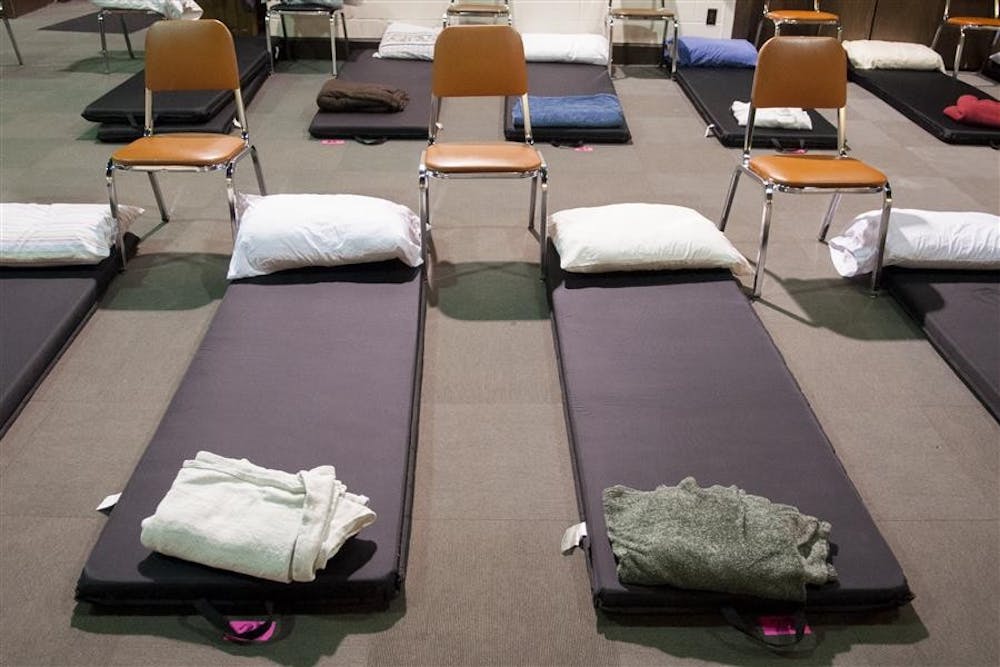The homeless of Bloomington wander through the night, drawn by the warmth and food offered at First United Church the night of Nov. 8. They wait outside in steadily decreasing temperatures until three minutes after 9 p.m.
The volunteer staff unlock the doors of the Interfaith Winter Shelter.
Russ Clancy, one of more than 50 homeless to arrive that night, said he was astonished by the generosity and warmth the shelter workers offered him.
“I love these people and what they do for us,” Clancy said.
As the smell of chili and broccoli soup wafts from the kitchen area, volunteers check in men and women as they come through the doors.
Mark Bauman, a parishioner at St. Paul Catholic Center and volunteer, said while the shelter moves from location to location each night, the system they use is efficient.
“It’s usually very organized and very quiet,” Bauman said.
Every individual who walks in searching for a place to stay the night is provided with a number which corresponds to a mattress in one of the adjoining rooms. After being checked in, men and women get in line to receive a warm meal from the kitchen staff.
After the meal, all the homeless are “wanded” before they go to sleep for the night. Volunteers use a hand-held metal detector to scan each person, and any weapons or extra belongings are stored by workers until the morning.
The shelter is considered low-barrier, not allowing drugs and alcohol to be consumed while in the space, but guests can bring these items into the facility.
Bauman said he has been a part of the shelter program for two or three years, and there is a big need for it in Bloomington. While Bauman said he got involved through St. Paul, he does not think of the shelter as a religious program .
“I don’t think of it as faith-based,” Bauman said. “It’s more community-based — a civic responsibility.”
Andre Quan, a junior at IU, got involved at the shelter just four weeks ago through a school organization known as Serve IT, a nonprofit informatics group. Quan said he began working at the shelter to fulfill his service hour requirements for Serve IT.
Quan said he loves working at the shelter and seeing the impact the volunteers make on the lives of the homeless.
“They don’t have to do it,” Quan said. “But the homeless really depend on them.”
Clancy repeatedly told workers how blessed he was by their work and the shelter they provided him with Tuesday night.
“Everyone is happy and smiling,” Clancy said. “I think that’s the best.”
Clancy said he became homeless only a few years ago after a car accident. Before the accident, Clancy said he spent 32 years working as a hairdresser on Kirkwood in Bloomington.
One of the many other homeless with Clancy was Chris George, an experienced construction worker who’s now on the street.
George said he had worked on Marriot Hotels for years, living out of the hotels as he traveled throughout Indiana. He is still working in Bloomington but said he has fallen on hard times.
George lived out of those hotels until a blood condition forced him to have surgery and take a leave of absence. Soon after his surgery, George said he was forced out on the street.
“I was living in hotels,” George said. “And the money just ran out.”
Another volunteer, Annie Schroeder, said she would like to see a permanent location established at some point. Schroeder said she does not see the need for the shelter changing and a permanent location would help both the city and the homeless.
“It’s a necessity,” Schroeder said. “There’s always going to be homeless people.”
As the lights were turned off, the homeless went to sleep and the workers for the second shift settled in.
Schroeder said working at the shelter gave her a new perspective on life.
She said sometimes it can be daunting to help at the shelter, and sometimes fights threaten to break out, but Schroeder said she will continue to volunteer.
“Sometimes it can be kind of scary,” Schroeder said. “But I think I’ll always want to help out.”
Volunteers for the shelter are drawn from different churches and groups from across the city, and Clancy said the way those different people treat him is so important. He said each volunteer treats him like a human and with respect — something that happens rarely.
“They just treat us well,” Clancy said. “That’s what it’s about.”






